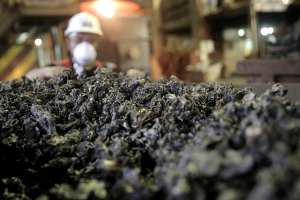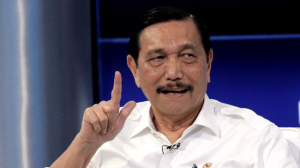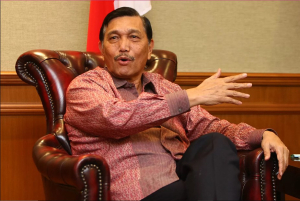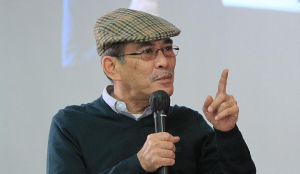Faisal Basri criticizes nickel downstream policy, sparks response from the government on tax profits and added-value
Faisal Basri, a senior economist from the Institute for Development of Economics and Finance (INDEF), criticized President Joko 'Jokowi' Widodo regarding the government's downstream policy, claiming that the policy only profits China.
The president had denied the criticism, but Faisal countered Jokowi's denial with a number of supporting data.
Previously, the President provided a number of data to support the argument that the downstreaming policy had brought benefits, such as income which increased sharply due to the downstreaming of export proceeds.
The data stated that downstreaming actually boosted deposits of nickel commodities into the state treasury from IDR 17 trillion prior to downstreaming, to IDR 510 trillion in 2022.
Downstream policy benefits Chinese economy
However, Faisal provided a number of data that refuted Jokowi's criticism of Faisal regarding the downstream policy. According to him, the sources and calculations of the president's data were unclear. Most of the profits continue to flow into the Chinese economy, with the national economy no more than 10%.
Faisal explained the process of calculating and elaborating what he did through the formula: Smelter added value equals to smelter product subtracted by nickel ore (Smelter added value = smelter product - nickel ore).
The added value is enjoyed by entrepreneurs in the form of profits, by investors in the form of interest, by workers in the form of wages, and by landowners in the form of rent.
"The president wants to prove that the nickel downstream policy is very profitable for Indonesia and that the accusation that most of the downstream policy is enjoyed by China is not true," said Faisal, on August 12, 2023.
Faisal quoted Statistics Indonesia (BPS) for 2014 and 2022. He said nickel exports had indeed jumped with fantastic results. Nickel exports in 2014, reached IDR 1 trillion (US$ 85,913). Meanwhile, in 2022, the export value will reach IDR 413.9 trillion (US$ 27.8 billion). However, he again asked whether the money from the exports really flowed to Indonesia.
Where the downstreaming money goes
Faisal explained that almost all nickel ore processing smelter companies are 100% owned by China and Indonesia have free foreign exchange. With this free foreign exchange policy, it is the right of Chinese companies to bring all of their exports abroad or to their own country.
Meanwhile, nearly one hundred percent of capital comes from Chinese banking, so almost all interest income also flows to China.
In addition, many Chinese workers include cooks, security guards, statisticians, and drivers. Most Chinese workers use visitor visas, not work visas. As a result, state losses arise in the form of labor contributions of US$ 100 per worker per month and visa holders who do not have to pay income tax.
He added, the export of refined nickel ore is not subject to any tax at all. He then compared it with palm oil and its derivatives, this is different from the export of palm oil which is subject to export taxes or export duties plus levies in the form of palm oil duties.
"So the government's revenue from exports of all types of nickel smelter products is zero, aka big zero," said Faisal.
Zero government revenue
All tax benefits from nickel smelter companies are currently nil because they are tax-free because they have enjoyed a tax holiday for more than 20 years, in contrast to palm oil processing companies.
"So, there is also zero government revenue from the extraordinary profits enjoyed by nickel smelter companies. Chinese smelter companies are enjoying the 'red carpet' because they are awarded the status of a national strategic project," he said.
On the other hand, he said the downstream policy implemented by the government was reckless and did very little to increase national added value.
"The nickel downstream policy has been going on for almost a decade. However, the role of the manufacturing industry sector has continued to decline, from 21.1% in 2014 to only 18.3% in 2022, the lowest point since the last 33 years," he said.
As for Faisal, he said that the current presence of nickel smelters does not deepen the structure of the national industry at all, the role of the manufacturing sector is actually decreasing.
"Never mind imagining smelter products in the form of iron and steel that can be directly used for the automotive, aeroplane, ship industries, even for the household appliance industry such as pots, spoons, forks and even knives," he concluded.
In addition, the added value enjoyed by Chinese smelter companies is getting bigger because they buy nickel ore at super cheap prices, because the government sets nickel ore prices much lower than international prices.
Government responds to Faisal's statement
Septian Hario Seto, Deputy for Investment and Mining at the Coordinating Ministry for Marine Affairs and Fisheries, responded to Faisal's statement that there was a lot of data that was not updated and was incorrect.
Septian answered Faisal's criticism regarding the advantages of downstream by providing different data. He said the export figures were only iron and steel worth US$ 278 billion. Downstream nickel also produces lithium battery materials such as nickel matte and Mixed Hydrate Precipitate (MHP) which are incorporated in HS Code 75 worth US$ 3.8 billion and US$ 2.1 billion. Meanwhile, other nickel derivatives reached US$ 34.3 billion (IDR 510.1 trillion).
He also highlighted Faisal's claim that the state received little revenue from the nickel ore export ban because the company received a tax holiday for 20 years. He said Faisal did not fully understand the tax holiday provisions so he reached the wrong conclusion.
According to him, a tax holiday for 20 years is only given for investments of IDR 30 trillion or more. If less, it will adjust the period between 5-15 years. This tax incentive is only for corporate income tax, other taxes must still be paid," he said.
He said, on average, smelter companies receive a tax holiday of 7-10 years based on 2018-2020 data. There are only 2 that have earned 20 years, with only one in operation. There are still many smelter companies that do not receive a tax holiday because they do not meet the requirements.
"For the smelters that were built in the 2014-2016 period and received a tax holiday for 7 years, now they have started paying corporate income tax," he said.
Seto said that tax revenue in 2022 from the nickel downstream sector was IDR 17.96 trillion, or an increase of 10.8x compared to 2016 of IDR 1.66 trillion. Last year's corporate income tax revenue also increased from IDR 0.34 trillion in 2016 to IDR 7.36 trillion in 2022.
He also provides an overall analysis regarding the added value of downstream nickel. From 100% of the value of smelter products, the contribution of nickel ore is 40%, 12% of the operating profit enjoyed by investors assuming they get a tax holiday, and 48% is additional resources that need to be spent to process nickel ore.
According to him, 48% of that figure, 32% is enjoyed by domestic economic actors in the form of coal for electricity, labor and other raw materials. Only 16% is enjoyed by suppliers from abroad. Based on this data, the value enjoyed from abroad is 16% plus 12% operating profit, so that it becomes 28%.
Tag
Already have an account? Sign In
-
Start reading
Freemium
-
Monthly Subscription
20% OFF$29.75
$37.19/MonthCancel anytime
This offer is open to all new subscribers!
Subscribe now -
Yearly Subscription
33% OFF$228.13
$340.5/YearCancel anytime
This offer is open to all new subscribers!
Subscribe now







